How to Compost – Magnificent Garden Soil
Do you compost? Oh my gosh, if you don’t, why not?!!! It is easy, it’s great for the environment and it will result in amazing nutrient rich soil that surpasses anything you can buy from a store! Some of the additional benefits are that you will reduce the amount of trash you produce and keep things out of the landfill.
Keep reading to learn How to Compost and create your own magnificent garden soil!
Now, I totally understand if you are living in the big city in an apartment and really don’t have space for compost let alone potted plants (but if you do want to compost, read more about worm composting in a container.) However, f you have a yard, you really should be composting! It’s easy, it takes very little time, and my little wiggly BFFs (aka worms) do all the work for you.
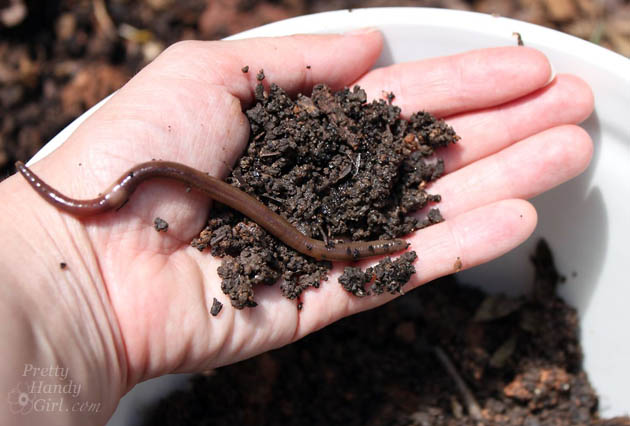
That’s right, they eat up all your kitchen and yard waste and turn it into beautiful black soil. How do they do it? If I tell you, you have to promise that you won’t get grossed out. They poop it out. LOL. Yup, compost is decomposition and worm castings (a nicer word for worm poop.) Please don’t run away, find out how easy it is to create this magnificent garden soil.
Here’s the basics for how to compost and get top quality soil for your garden and landscaping for FREE!
How to Compost – Magnificent Garden Soil Materials:
(I’ve included affiliate links for your convenience. I earn a small percentage from a purchase using these links. There is no additional cost to you. You can read more about affiliate links here.)
- Spading Fork
- Sealed bucket or container to store kitchen scraps:
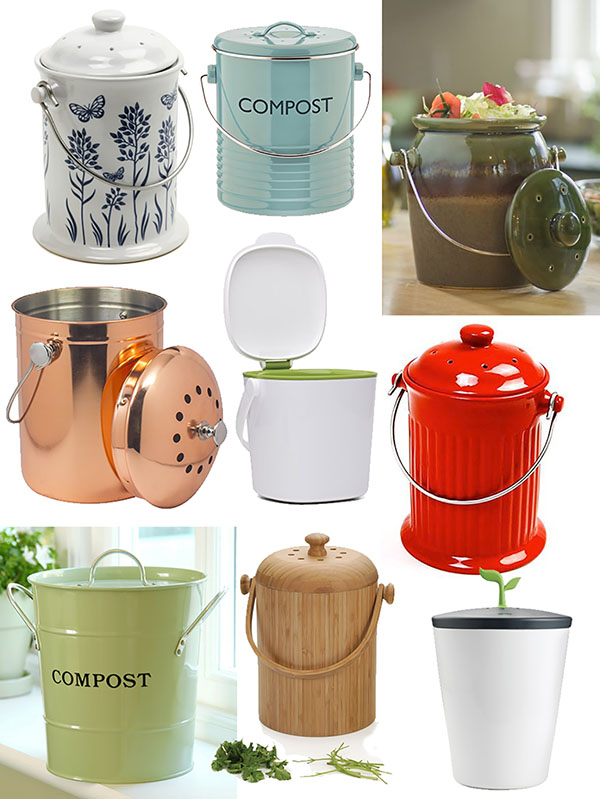
Blue and White Floral Crock | Sea Blue Compost Crock | Green Stoneware Crock
Copper Compost Bin | OXO Flip Lid Compost Container | Red Ceramic Crock
Green Metal Pail | Bamboo Compost Pail | Sprout Compost Container
What can be composted?
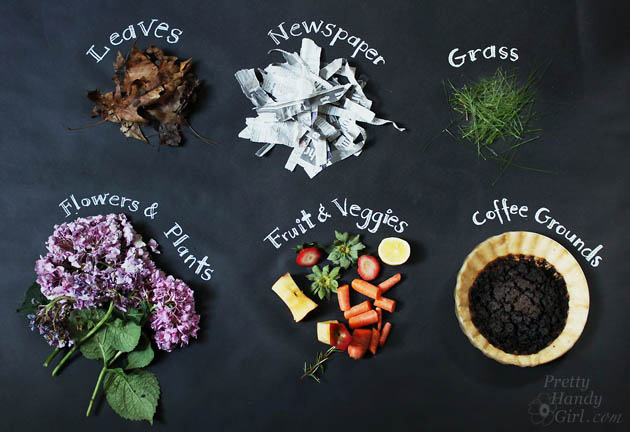
- Kitchen scraps
- raw fruits
- vegetables
- egg shells
- Coffee grounds and the filter
- Newspapers, non-glossy cardboard, paper towels
- Leaves (brown for carbon and green for nitrogen rich)
- Grass clippings
- Plant & flower clippings
- Yard waste
What can’t be composted?
- Meats
- Dairy products
- Processed foods
- Plastic
- Man made substances
- Metals
Okay, you get the picture. Only raw fruits and veggies (and egg shells), okay?
Location:
Your pile doesn’t have to be anything special. A simple a hole in the ground is fine. Find a partially shaded spot in your yard. A shady spot is ideal so the pile doesn’t get dried out in the hot sun. If you’ve had a dry spell for a while, go ahead and water the pile. If you have pets, put a little fencing around it to keep them from getting into the compost. (Eating decomposing food can make them sick.) Don’t worry too much about wild animals (unless you have a serious pest problem.) Animals will come sniffing around and may dig a scrap or two out of the pile, but they rarely take up residence in your yard. However, if you are concerned about pests, go ahead and purchase a closed bin for your yard. Otherwise, save your money, a fancy tumbler or bin aren’t necessary for the compost to produce.
How to Compost:
Keep your compost bucket in your kitchen. (We keep our pail under the sink, but if you have a pretty container you can leave it on the countertop.)
After cutting veggies or fruit, toss the scraps in the bucket. Coffee grounds can get thrown in, filter and all! Egg shells are also great for your compost.
When the bucket is full, take your scraps outside to the compost pile. Clear a hole in your pile, dump the scraps and cover them over with dirt or soil (this will prevent attracting too much wildlife to your pile.)
Occasionally throw in some torn up strips of newspaper to add some “carbon” source to the pile. The key to a healthy compost is to have a good mixture of green (nitrogen rich) vs. brown (carbon rich) materials. Don’t overload on grass clippings or yard waste.
Flip some fresh soil on top of the scraps and walk away! That’s it. What about my BFFs, the worms? If you start the pile, they will come. Trust me, they’ll find your pile. If you’re super antsy, you could buy some red wigglers from a fishing bait place, but honestly why bother? Soon you’ll have big fat overfed worms happily working for you for free. Go back in 2-3 weeks and check on the progress of your magnificent garden soil.
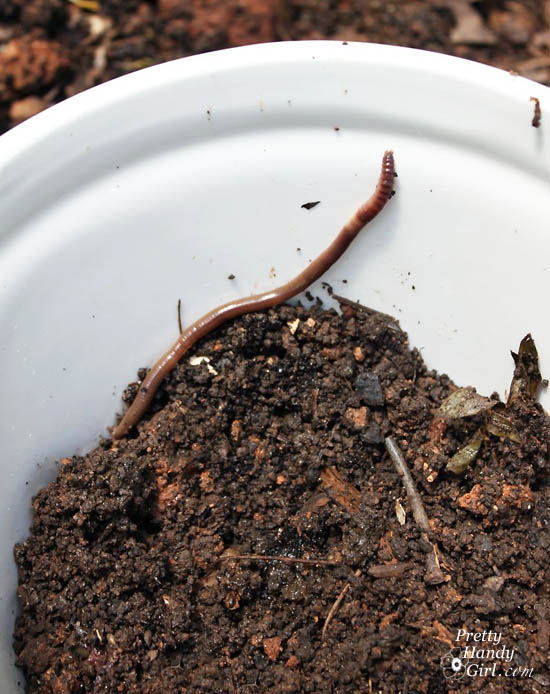
I usually grab my magnificent soil from the bottom when I need it. But, you can split your pile in two. Use one side to add scraps to and let the other side “marinade” to perfection. Then switch sides. Frankly my little worm army works pretty fast. Within a month they have produced enough compost to fill some potted plants and more. I rarely buy soil anymore unless I need a huge amount.
What about composting in the winter? If you aren’t under a dumping of snow, your pile can still work in the winter. In fact, you’ll be surprised to see the warm steam rising from the pile when you dig into the center.
Compost Tea:
Now that you have a rockin’ compost pile you may want to learn how to make a compost tea to further nourish your plants and help them be healthier and heartier! I haven’t tried it yet, but you better believe I’ll be brewing some compost tea this year.
Share this article with your friends and do something environmentally friendly! Pin this graphic to refer to later:
Now that you have compost to use, learn how to create a rot resistant planter bed:
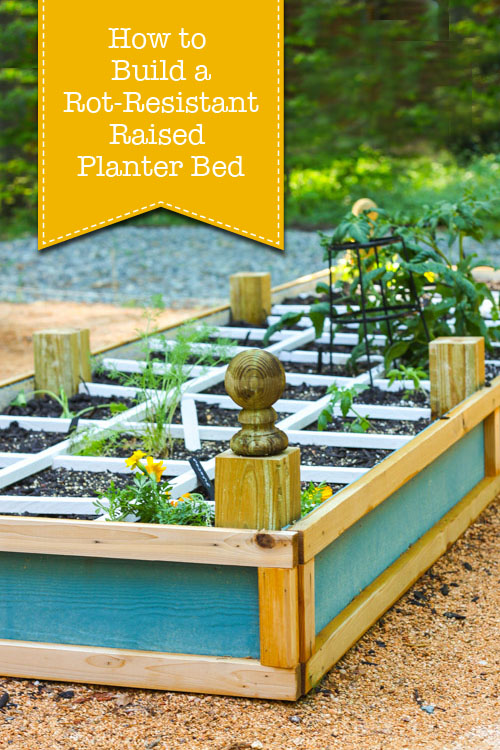
And maybe you want to dip your toes in the Square Foot Gardening craze!

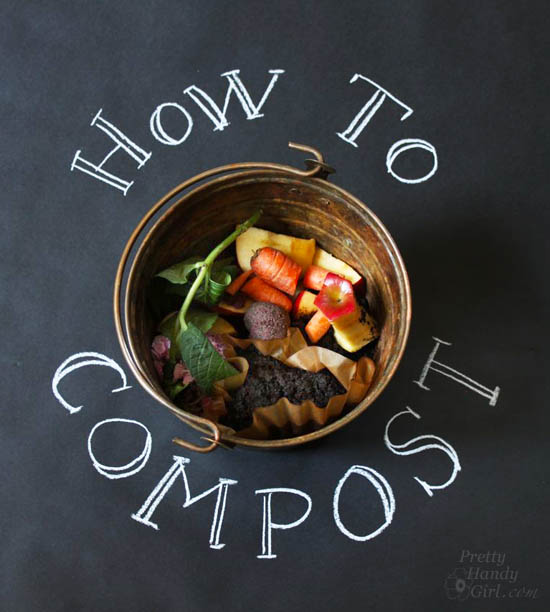
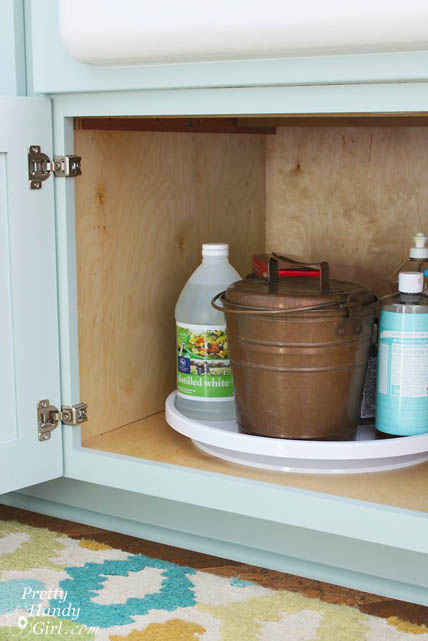
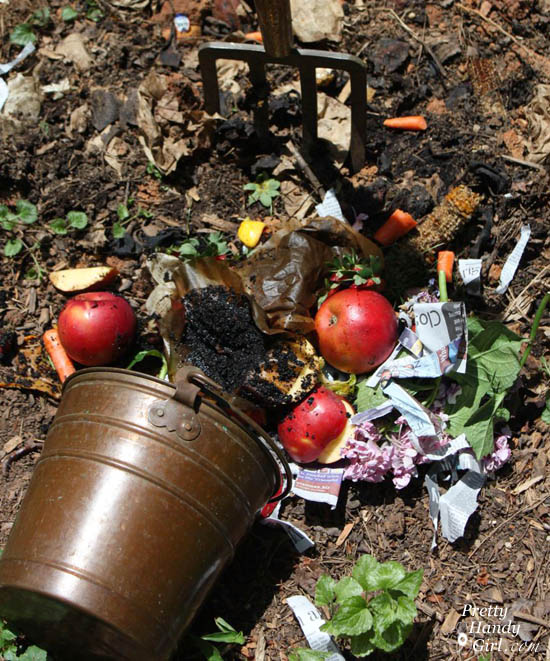



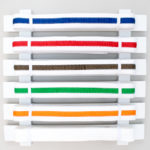
I have what appeared to be maggots as well. They are soldier fly maggots. They do lots of work on the compost( I have heard what sounds like rice krispies in milk at times when composting, that’s how active they are) I was told the flies that result have no interest in people or our food. When I began looking online, I was amazed that more people had these, and were seriously creeped out. I was until I realized what they were. No, they aren’t as cute as my wiggly worms in my former location, but man, these guys do quick work, and I live in an area where I have an open pile, not a tumbler anymore.
http://www.apartmenttherapy.com/skip-the-bin-trench-composting-152312
Hey Brittany can you give some advise about the maggot problems as I would also like to know. Is it ok that you would have maggots in your compost because the kitchen scraps sat for too long and maggots were in the pot. Thanks!
Randolph, you can go ahead and throw your kitchen scraps out into your compost pile. It’s not going to harm you. You definitely want to use a small bin that seals tight (1 gallon or smaller). Then be sure to empty your scraps at least once a week.
Hey Brittany!
Yes do you have any comments about the last two entries with the maggot problem? I would also like to know if the maggots are ok to dump into the compost bin?
Hi! I’ve had the same problem as Beth, with maggots – giant creepy guys. My husband is a juicer, veggies only. We have the countertop scrap container with the holes in the lid and some kind of carbon filter. So, all spring and summer long I’ve been hauling, dumping, and mixing these pulverized veggie scraps along with our coffee and tea bags. My outdoor compost bin was made by my dad. Its a dark trashcan with holes in the sides. He somehow drilled these 1″ holes all around. The lid is the type you spin and lock. Ok, all of this time I’ve been dumping and stirring, right? Yes. (My dad was the guy who got me started with composting and I think it’s awesome! But he’s always told me to keep it in the sun?) Also, when I’d go to stir, it had the most awful smell!! I can’t even describe it. I know it’s supposed to smell like dirt, but…? One day I’m standing near the bin and I hear strange noises. I followed the sounds and found they were coming from the bin. Opened the lid and discovered tons of these giant maggots!! They obviously were not fly’s. They were brown with ringed bodies and at least an inch long. I was so disappointed! Do not know at all what I did wrong and had to throw the whole thing away:-‘( What the heck did I do wrong? It’s not rocket science. I’d really appreciate some help so maybe one day I can start all over? Thanks for reading!
Christina,
I did a little bit of research and my initial thoughts is that your compost might be too hot and too damp if it’s in a closed up container. Did you add worms to your bin? If not, I’d recommend dumping the scraps out and start over. This time be sure you have enough carbon, add some red wiggler worms (buy at a fishing supply shop.) Personally I’ve had better luck without a bin. Just a hole in the ground ;-).
Just for posterity since it has been a few months, but the problem with your compost is that it is too green. Like the author said, you must maintain a balance between “green” and “brown” items. Veggies and stuff that comes out of the house are all green: wet, full of nitrogen, turn to mush. You need brown to balance it, and a few teabags and coffee is not going to do it. You need leaves, sawdust, straw, dry stuff that will balance out the wet. Your compost stinks and is rotting because actual decomposition cannot happen in an overly wet environment. Wetness means lack of oxygen, and those microbes you’re trying to proliferate need oxygen. Dry up the compost and you’ll see a definite improvement. Of course, you don’t want to be too dry either, but to me, you probably wont have that problem. You also shouldn’t have maggots because they cannot take the heat (literally) of proper decomposition. They need rotting stuff.
Once I had to search through a compost bin for something that had accidently been knocked into the kitchen scraps, and it was full of maggots. Worms I’m okay with, maggots give me the willies. That incident has kept me from composting. What I’m wondering is, if you use a container for composting, do you need to introduce worms to it, is there a way to keep maggots out of it, and if you just dig a hole in the ground do you have the maggot problem?
Beth, I haven’t had a maggot problem, but I did some research about maggots in compost piles and it’s not going to hurt your pile. They are a part of nature. 😉 Yes, if you are container composting, you’ll have to add worms. But, I like the hole in the ground composting. It’s a lot less maintenance.
I’m about a year late to this conversation, but I wanted to point out that a compost pile will usually only get maggots if something like meat or dairy is put into it. Meat and dairy also attracts animals like skunks, raccoons, and coyotes. Some animals are okay in the pile because, believe it or not, their poop is good stuff. I add rabbit and chicken poop and used wood chip bedding to my pile. And don’t forget your teabags–they can go in, too.
I’m not a gardener, but I truly love the idea of using scraps that would otherwise end up in a landfill!! Thanks for the great post!
I like your post on composting…simple and easy to understand. I wish more folks would do it. It’s not only “good” in the obvious way for the garden, but good for the earth! Thanks for your wise words!
Had to share this with my viewers! Great pic / diagram for those who are confused or skeptical of composting.
Thanks Brittany. I saw you shared on FB. Thank you for that!
i used to compost in plastic container with bottom holes
it is simple and easy way
i used to put suitable layer of dry leaves then daily adding of kitchen scrubs of veg. and fruits
it takes few weeks to fill the container with mixing every few days then surface layer of dry leaves again then some soil or old compost then turning the container upside down every few days
it takes about 3 months to be ready when it becomes third of its original size with change of colour to brown and disappearance of bad odour
when its odor look like soil following rain this means your compost is ready to use
Good tips! Thanks for sharing.
I’ve always heard of composting and I’m glad to learn its this easy! I have began a flower and vegetable garden recently in my yard. Will the worms be pests to my garden or do they only eat dirt? Thank you for this informative and fun article.
Rosalina, those little worms are truly your BFFs! They continue to condition and aerate the soil in your garden! They don’t eat live plants or their roots that I’m aware of.
Do you not have issues with wild animals eating the scraps?
Lena, not that I’ve noticed. I’m sure they might nibble a little, but I never see any evidence of them being there and I always have plenty of good soil!
You make it easy. For a year, when I go to a big store outlet, they have barrels for 300.00 bucks. The barrel is on wheels and has a crank to mix it. I thought that was a little expensive. I held out. Seeing your wonderful article gives me inspiration. Thank you so much.
I alway wanted to try this…thanks for making it seem so simple! And I did pin it 🙂
Thanks Susan. You will be so thrilled when you see the first batch of black gold!
Thankyou for all the information,given,I will give it a try,I live in Spain,so guess my heap will dry out,but will water now and again,I never see worms,but again nothing ventured nothing gained,always buying bags of peat,so to have something like this to add to it would be great,
Thanks again
You are so awesome! I just love you. I recently purchased a little house and cannot wait to get my yard in order! Thank you for the great ideas!!! Oh, I just love you!!
Congrats on your new home Latoya! And I know you’ll love saving money on potting soil and having a less full trashcan.
Great tips in good detail. Thanks for the post, always after tips like this!
my grandpa used to raise worms to sell to the bait shops in the area back in the sixties and seventies to help supplement his disability payments. my grandma had the best vegetable & flower garden plus her potted plants and ferns were just awesome. she used the worm castings from all of grandpa’s worm beds to fertilize with. grandma called it “super poop”.
Michelle, that’s awesome! I love that he called it super poop. LOL.
Nice idea
Awesome comment Michelle. This raises my hopes for my plan to start an organic garden. My husband has gotten me some 50 gallen barrels he is cutting in half for me so I won’t have to bend over so far to pick my vegetables. Thank you for raising my hopes to a higher level.